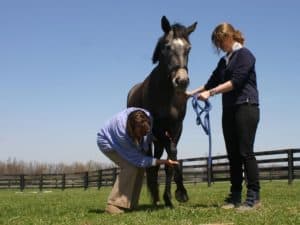Bill would Forbid Horse Processing in Maine
- Topics: Article, Slaughter, State & Local Legalities
Horse processing and the transport of horses to slaughter plants in Canada would be illegal in Maine under a bill now pending in that state’s legislature.
Horse slaughter has not taken place in the United States since 2007 when a combination of legislation and court decisions shuttered the last remaining horse processing plants. Since 2007, horses have been transported to plants in Mexico and Canada for processing, while U.S. several states have enacted legislation that would ban horse processing plant development. In November 2011, horse processing for human consumption again became possible in the United States when Congress passed legislation that did not specifically deny the USDA funding to carry out inspections at domestic horses processing plants. Currently, no horse processing plants are operating in the United States; however, a proposed plant in New Mexico is awaiting a permit that would allow USDA Food Inspection Service personnel to carry out horsemeat inspections at that plant.
On April 2, Maine State Reps. Gary Knight and Elizabeth Dickerson introduced LD 1286, a bipartisan bill that would forbid anyone from causing the death or slaughter of a horse intended for human consumption. The legislation would also forbid anyone from giving or receiving a horse intended for slaughter, and establishes statewide ban the export or import of horses to Maine for transport to processing plants elsewhere. If passed, LD 1286 would forbid the sale of horsemeat for human consumption in Maine as well as banning the development of horse processing plants in that state. If LD 1286 becomes law violators could be charged with a felony crime. If convicted, violators could be court-ordered to receive mental health evaluation and counseling, could be barred from owning or residing with animals, and could be required to receive humane instruction as ordered by the court.
According to the Maine Friends of Animals website, 1,500 horses annually travel through Maine to processing plants in Canada. Robert Fisk, spokesman for that statewide humane organization, said that proponents pondered introducing introducing similar legislation three years ago but based on the make-up of the legislature decided not to pursue it
Create a free account with TheHorse.com to view this content.
TheHorse.com is home to thousands of free articles about horse health care. In order to access some of our exclusive free content, you must be signed into TheHorse.com.
Start your free account today!
Already have an account?
and continue reading.
Written by:
Pat Raia
Related Articles
Stay on top of the most recent Horse Health news with












